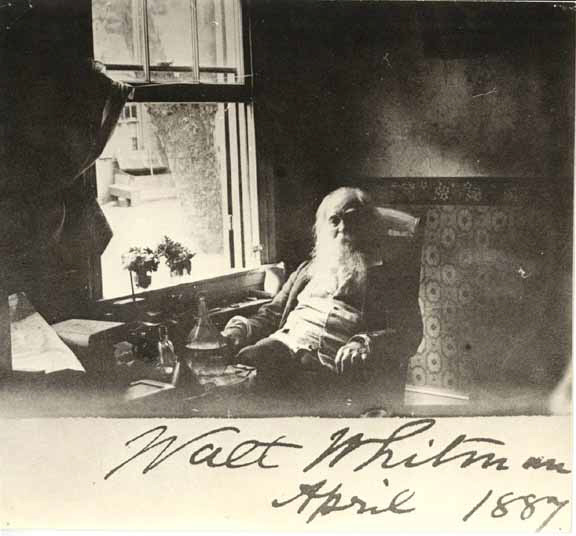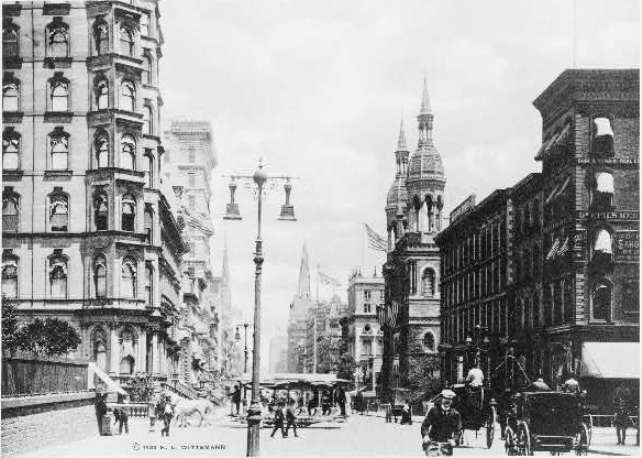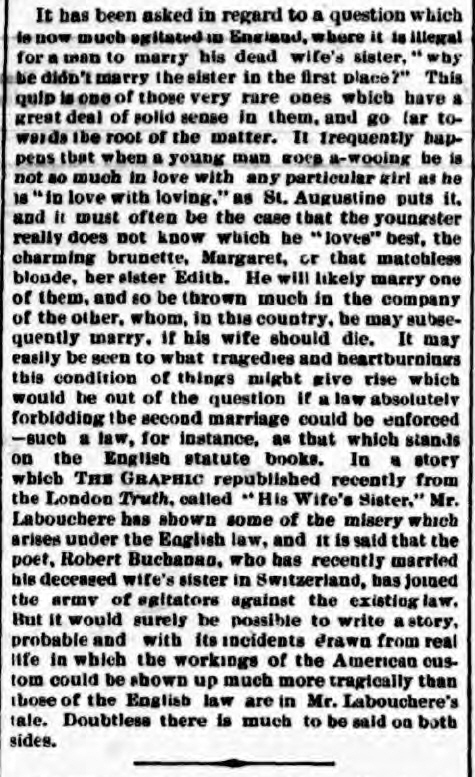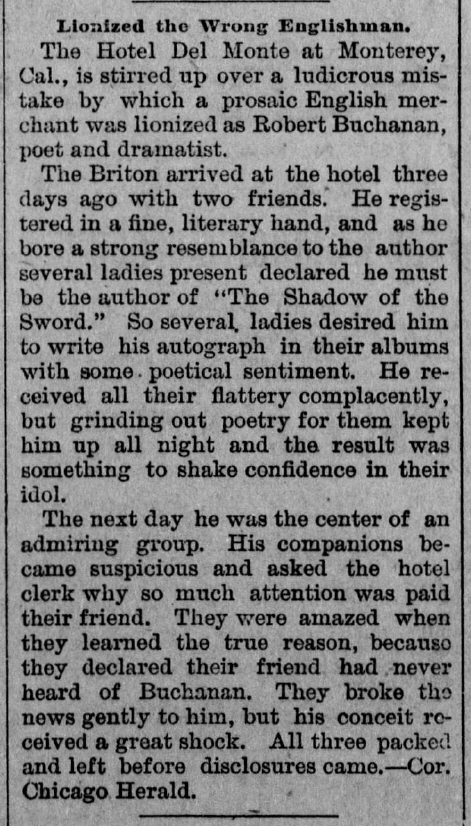|
Play List: 4. Corinne 7. The Mormons 9. Lucy Brandon 10. Storm-Beaten 11. Lady Clare 13. Bachelors 14. Constance 15. Lottie 16. Agnes 17. Alone in London 18. Sophia 19. Fascination 20. The Blue Bells of Scotland 21. Partners 24. Angelina! 25. The Old Home 26. A Man’s Shadow 27. Theodora 29. Clarissa 30. Miss Tomboy 32. Sweet Nancy 33. The English Rose 36. Marmion 37. The Gifted Lady 38. The Trumpet Call 39. Squire Kate 40. The White Rose 42. The Black Domino 44. The Charlatan 45. Dick Sheridan 47. Lady Gladys 48. The Strange Adventures of Miss Brown 49. The Romance of the Shopwalker 52. Two Little Maids from School ___ |
|
ROBERT WILLIAMS BUCHANAN (1841 - 1901) |
|
|
|
|
|
|
|
|
BUCHANAN’S THEATRICAL VENTURES IN AMERICA 1884-1885 - continued (ii)
Walt Whitman and Herman Melville
At least, as Harriett Jay reports in her two paragraphs, Buchanan did manage to meet with Walt Whitman during the run of Alone in London in Philadelphia, sometime in March, 1885. The meeting is recalled by Whitman in Horace Traubel’s With Walt Whitman in Camden (Vol. 6, p. 245-246 - available at the Walt Whitman Archive): Tuesday, January 14, 1890 7.15 P.M. W. in his room, but not reading, though the light was full on. Not out today—it was too cold. I have been reading Roden Noel’s Whitman. I said of it, for one thing, this evening: “However friendly and admiring, he still takes scarce measure of Leaves of Grass.” W. thereupon: “Well—our utmost anyhow would be to say: it is very friendly. I have always felt that the book was amateurish—the work of a young man. That copy I have I suppose Noel sent”—but there was no name in it. I resented also the notes of Noel—stating Buchanan and Whitman in too-close terms. W. laughed at my warmth: “Do you know much about Buchanan?” Adding, when I asked him about B.’s “genius.” “I don’t know. Buchanan has a great idea of making money—has written plays, novels. He lost a wife of whom he was very fond: it was a great change for him. She left him a niece—a fine young girl, Harriet Gay, who afterwards went on the stage. It is for her Browning writes plays—makes a part for her—to fit her. She has been here a couple of times—has grown up a handsome, bright girl. Although decidedly girlish, crude, youthful, now—she is of the Byron kind: I should not be surprised any morning to wake up and find her famous. Yes—I have seen Buchanan, too—twice, if I remember right—he has been here. He is a typical John Bull—short, thick, ruddy, assertive, brusque—thick-necked. He came once—I think I have told you—we sat down-stairs—in the sitting-room —the room underneath this. It was a cold day—I found it difficult to get comfortable even with a fire—was hustling up the fire. Buchanan came in a carriage— jumped out and came indoors. After he had been in some time—a half hour at least, he said something about the carriage and some one he had left in it—and when I inquired who he told me Harriet Gay, the wife’s niece. I asked, ‘What, and you have left her there and in the cold all this time? Go out this instant and bring her in: she must be frozen to death.’ And he did so—I not keeping her in the parlor but sending her back in the kitchen, where it was warmer and where Mrs. Davis gave her a cup of tea to thaw her out.” He told this story with great vehemence and then said, “But of course Buchanan is more than that—has a comradeship side to him,” though “these human derelictions a man don’t altogether get over.” ___
Buchanan also referred to the meeting in ‘Latter-Day Leaves. No. 9—The Last Year of the Century’ published in the Sunday Special on 31st December, 1899. “I sent my New Year’s greetings to Walt Whitman, with the assurance that at least half a dozen Englishmen joined with me in that message of affectionate homage; and shortly afterwards I visited him personally in his lonely lodgings in New Jersey, across the ferry from Philadelphia. He was old, worn, weary and weather-beaten but when the chord of fellowship was struck as gently dominant and simply wise as ever. The rooms where he dwelt were very poor, his diet appeared chiefly to consist of brackish tea and custard pie—many English labourers indeed have better shelter and more sumptuous fare. And his talk! Well, I have heard Scottish peasants and English mariners talk as simply, with something of the same grave faith in the Law of Life which flows to righteousness. His very vanity was beautiful and childlike. I had with me a lady who had been reared in the belief that Walt was a great and Christlike man, and when she asked for his photograph he offered her not one but many, writing his autograph under each with boyish satisfaction and delight. Yet with all this he was sublimely free of the slightest literary self-consciousness, only it seemed to him the most natural thing in the world that we should be there with him, offering him the eager tribute of our love. He had not one word of regret over his pitiable poverty, or of bitterness towards the literary classes which had insulted and neglected him; he was perfectly satisfied with himself, with the world, with all Humanity. Though he loved such simple fame as came to him, though praise and sympathy made him happy, he did not live for these things—his thoughts were fixed higher, in the region of a perfectly peaceful and innocent Joy of Life.” |
 |
 |
|
And another American response to the poem appeared in this New York journal: The Critic (29 August,1885) —The Academy of August 15 wastes a page of its space by filling it with a bit of doggerel called ‘Socrates in Camden. With a Look Round,’ by Robert Buchanan. Mr. Buchanan has not been as heartily welcomed by the literary class in this country as he hoped to be, and Walt Whitman’s kindness to him is responsible for this effusion, in which it is sought to extinguish the literary lights of Boston by using the ‘good, gray poet’ as a snuffer. The last lines in the poem are better than the rest. They run in this wise: Poet divine, strong soul of fire, ___
Although it should be added that the response to the poem was no better in Britain: The Edinburgh Evening News (17 August, 1885 - p.2) In a long screed of doggerel in the current Academy Mr Robert Buchanan informs the world of letters that he has paid a visit to Walt Whitman at Camden, N.J., and that he holds the Boston school of poets and novelists a set of very inferior persons. He has surely misread Whitman’s message if he considers it necessary, in order to show his admiration for the “Camden Socrates,” to fling the mud of gratuitous impertinence at poets who choose to write verse instead of verbiage and the novelists who prefer analysis to melodrama. Messrs. James and Howells may be “linen drapers” and “man-milliners,” but at least they are artists; whereas Mr Buchanan, of late years, has sunk all sense of art in a passion for stage carpentery. As for his poetry, we could almost wish that Mr Buchanan might adopt Whitman’s unsophisticated rhythms when we find him perpetrating such execrable rhymes as “clothes” and “Thoreau’s,” “daughters” and “garters.” |
 |
|
[The corner of 42nd and 5th Avenue. New York, 1885.]
The Leaving of America
I have no idea when Buchanan and Jay actually left America. According to Buchanan’s introduction in the Olympic programme for Alone in London, Harriett Jay left first “to produce the play in England”, which seems to be confirmed by the prominence of her name in that announcement in The Era of 8th. August, 1885 (although Buchanan was also back home in England by then). Harriett Jay gives the reason for Buchanan’s departure as ill health, which seems to be confirmed by the reports in the press. I came across the following item which pushes the date of departure another month past the letter to Augustin Daly about Fascination:
The National Police Gazette (New York) (9 May, 1885 - p.3) Robert Buchanan and Harriett Jay will return to England soon. Mr. Buchanan may do “Fascination,” a new play, in London. If a success there he will tour it here. ___
But a letter from Buchanan to Andrew Chatto of 22nd June, sent from his mother’s address at the Westward Ho boarding-house in Southend, is the earliest indication of Buchanan’s arrival back in England. On 30th July, 1885, the Edinburgh Evening News reported that “Mr Robert Buchanan, who has lately returned from a successful trip to the States, is lying ill at Southend.” And the same news was relayed back to America:
The Salt Lake Herald (1 August, 1885 - p.2) British Bits. LONDON, July 31.—Robert Buchanan is seriously ill. He has just finished a long dramatic poem. ___
The Daily Graphic (New York) (6 August, 1885) In a single breath the cable announces that Robert Buchanan is seriously ill and that he has just finished a long dramatic poem. Whether he was indiscreet enough to read his own work at one sitting, or whether the verses on our City Hall have been cabled to London and met his affrighted gaze, cannot yet be ascertained. ___
So, by the end of June 1885, Buchanan and Jay were both back in England, Buchanan lying ill at Southend, while Jay made preparations for the British premiere of Alone in London. The ‘long dramatic poem’ was the first part of The Earthquake which was finally published in December - the second part never appeared. The London production of Alone in London was beset with problems and Buchanan finally washed his hands of it, but by then he had begun a more successful stage of his theatrical career with Sophia. He never returned to America but his association with the American theatre continued. Sophia was produced at Wallack’s Theatre in November, 1886. In April, 1888, Partners was produced at the Madison-Square Theatre, and in September, Col. Sinn followed up his success with Alone in London with another two-year touring production of Fascination beginning at New York’s Fourteenth-Street Theatre. When Augustin Daly brought his company to London in the summer of 1886, Buchanan tried again, unsuccessfully, to interest him in A Madcap Prince, according to a letter of 28th July. However, in October 1889 Buchanan’s A Man’s Shadow, his adaptation of Jules Mary’s Roger-la-Honte, was further adapted by Augustin Daly for the American audience, its title changed to Roger la Honte; or, A Man’s Shadow, and was produced at Niblo’s Theatre with two stars of the English stage, William Terriss and Jessie Millward. In January 1892, Daniel Frohman produced Squire Kate at the Lyceum Theatre, starring Georgia Cayvan, who went on to tour America with the play for the next five years. Like Constance the play was never produced in Britain. 1892 also saw the American production of The English Rose by Buchanan and Sims in Boston and New York. Daniel Frohman also commissioned Buchanan to write a play about Richard Brinsley Sheridan, then rejected it in favour of one by an American playwright, Paul M. Potter. Potter’s version opened at New York’s Lyceum Theatre on 5 September, 1893 while Buchanan’s Dick Sheridan played at the Comedy Theatre in London from 3 February to 30 March, 1894. The third of Buchanan’s plays only seen in America, was Lady Gladys, which opened on 28 May, 1894 at the Madison Square Theatre and ran for two weeks. Minnie Seligman played the title role, which was originally intended for Lillie Langtry. Far more successful was the American production of The Strange Adventures of Miss Brown by Buchanan and Jay, which opened at New York’s Standard Theatre on 2 December, 1895 and ran for two months before going on tour. The final play of ‘Robert Buchanan’ to be performed in America was, of course, When Knights Were Bold, which opened at the Garrick Theatre in New York on 20 August, 1907, with Francis Wilson as Sir Guy de Vere and ran for 100 performances. ___
ON THE OCCASION OF THE DEPARTURE OF ROBERT MY Muse fu’ dowie faulds her wing, O Rab was bright an’ warm an’ free, O blythe it was I trow to trace The puir newspaper chields may mourn, Play-actor billies round him hung, The lang-haired literary louns O when he met wi’ men o’ spirit, That day he gaed on board the ship, Quo’ I, wi’ heart as saft as jeel, Sin’ syne I muse on Fortune’s quirk: But whiles round Friendship’s wreathéd urn JAMES KENNEDY (From The Deeside Lass, and other Poems (Aberdeen: Cormack & Co., 1888). More information about James Kennedy is available here.) _____
Buchanan’s American Trip - a final thought
This section of the site has undergone several changes over the years. It began as an attempt to separate the purely American productions from the rest of Buchanan’s theatrical output and was also meant to add a little more flesh to the bare bones of Harriett Jay’s two paragraph summation of their American adventure in her biography of Buchanan. As the ‘Plays’ section of the site grew, I moved most of the information on the American productions there and this section was reduced to a page of odd newspaper cuttings about the American trip. At this point I should apologise for the rather random nature of this section - working from various online newspaper archives is not the most accurate way to acquire a complete record of events. Bad scans, imperfect search engines, etc., will deliver only a fraction of the material one is looking for. However, what I have found I have used, and I doubt there is some vast hidden iceberg of material where Buchanan is lauded as a literary giant and Jay as the greatest actress of the age. Although Buchanan finally managed to produce a ‘hit’ play with Alone In London, a popular success for Cora Tanner and Col. Sinn, which they later repeated with Fascination, the American trip as a whole cannot be counted a resounding success.
Evening Journal (Albany, New York) (7 December, 1885) —Not a very flattering account of Robert Buchanan, the author, is given by To-Day. It says: When Robert Buchanan came to America he was the most cordially detested literary man that ever left London. When he returned he was the most cordially detested literary man that ever left New York. Personally I found Mr. Buchanan a by no means unamiable or unpleasant companion. But he possessed an exasperatingly arrogant bumptiousness and an unconcealed contempt for all men who write for a living but himself, safe to make enemies rise up around him wherever he goes. The worst trait in his character is his greed for money. He is insatiably hungry for it, and if the experience of those who dealt with him in business is credible, is about as tricky as a Twenty-fourth street horse dealer. His latest exploit is one of the most contemptible recorded against him. He has taken the newspaper criticisms of “Alone in London” and deliberately cut and garbled them so as to form the most really favorable notices of his play. One article stated that the play “Is full of clever ideas, but as a rule they are wasted.” Mr. Buchanan quotes that his play is full of clever ideas and ignores the rest. The other criticisms, none of which are at all favorable, are thus equally distorted out of their true meaning. The practice of manufacturing bricks without straw in this way is a common one here. Mr. Buchanan probably picked it up on his travels. It is painful that a man so undeniably strong in style and gifted in fancy as the author of “God and the Man” should descend to the tricks of the sideshowman; but he is not the first whom hunger for gold has dragged into the mire. ___
Whether or not Buchanan “was the most cordially detested literary man that ever left New York”, can’t really be proved, but one cannot deny a general air of, if not outright hostility, then ‘snideness’, in some of the newspaper reports that accompanied his American visit. Buchanan, of course, possessed a knack for making enemies, so it could just have been that, coupled with his overpraising of Harriett Jay’s dramatic talents, which made them both subject to derogatory comments. However, the item about Harriett Jay in The New York Times of 18th May, 1884, would suggest that this opinion of the couple was present before they ever set foot on American soil. Examining Buchanan’s connections with America prior to August 1884, might give a clue to how he was perceived. Buchanan’s biography of John James Audubon was published at the end of 1868, and after Audubon’s widow objected to some of Buchanan’s comments about her husband, which he refused to remove, his name was subsequently removed from later editions. In March, 1869, The Pall Mall Gazette, summed up Buchanan’s preface to his edition of Longfellow’s Poetical Works, as follows: “In six short pages this amiable editor has contrived to disparage a good many persons, including his author, and to leave a most unpleasant impression of dogmatism and pretension on the mental palate prepared to enjoy the Attic fare spread by a gentleman and a scholar. Such a banquet should have another marshal than Mr. Buchanan.” At the end of December, 1871, Buchanan published St. Abe and His Seven Wives, anonymously, but obviously intending it to be taken as the work of an American poet. He followed this with several poems in magazines, including one of his most popular, ‘Phil Blood’s Leap’, “by the author of St. Abe”, and then in October, 1873 a second long work, White Rose and Red, before his subterfuge was discovered. In March, 1876, he wrote his letter to the Daily News about Walt Whitman, in which he compared Whitman to a golden eagle, and the rest of the “established American poets” to “prosperous rooks and crows”. And then there is a hint of xenophobia in the American reaction to British authors selling their plays to America, which Buchanan had managed to do with Storm-Beaten and Lady Clare (the latter also having the whiff of plagiarism about it). This is without mentioning all the ill-feeling surrounding Buchanan due to the Fleshly School matter, which probably did make him “the most cordially detested literary man that ever left London.” But then there is still the matter of Harriett Jay. True, she was obviously not a great actress, although her limited talents did shine in the ‘trouser parts’. And, true, she was one of the’new women’, who dressed unconventionally and smoked cigarettes. But I do wonder, especially when reading that piece in the Broome Republican, which mentioned that “many New Yorkers were not disposed to admire Mr. Buchanan’s freedom in travelling and living with his sister-in-law”, whether there was a hint of scandal attached to the couple which never seemed to intrude into the British newspapers (perhaps because of Buchanan’s love of litigation, perhaps because there was obviously nothing to it). The false report that after his wife’s death in November, 1881, Buchanan and Jay had been secretly married in Switzerland, appeared in the American press as well as the British. Buchanan denied the rumour in a letter to The Era of 29th April, 1882, complaining that the paragraph about the marriage had been widely circulated “during the past week”. And in a similar letter to the Daily News of 1st May, he states that he believes the report originated in a Glasgow paper. However, the rumour had also appeared in America as early as 3rd March, 1882 in the New York paper, The Daily Graphic: |
 |
|
And the rumour of the marriage, or at least an inappropriate relationship between Buchanan and Jay, seems to have persisted in America for a few years following the American trip. An article about inappropriate relationships in The Daily Graphic (again) of 30th March, 1888, includes the following passage: “The romantic life, if so we may call it, of George Lewes and Miss Evans is another case in point. Who cares to inquire how it came about that John Ruskin’s wife became the married partner of Painter Millais? Nobody talked openly, though everybody whispered at times, about Philosopher Mill and Mrs. Taylor. To descend from empyrean heights, who refuses recognition to Robert Buchanan because of a well known relationship?” [Click the picture below to read the full article.] |
 |
 |
|
[From the Los Angeles Herald (29 September, 1892 - p.7).] _____
Next: Poetry Readings Back to the Plays
|
|
|
|
|
|
|